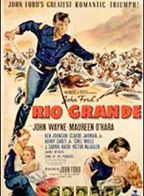
In the final movie of John Ford's Calvary Trilogy we find John Wayne as Col. Kirby York. Much of the movie is about his reconciliation with his wife and son who he has not seen in fifteen years.
As a backdrop we have another threat by the Apaches. The movie opens with Chief Natchez and some followers being brought in to the fort. The Indian scout identifies the captives as being from the Mescalero, Chircahua and White Mountain tribes. The different Apache tribes are uniting against the Calvary.
The movie's theme can be considered a continuation of the one in
She Wore a Yellow Ribbon". Americans must come together to fight off the threat to our freedom with the Indians once again representing the Communist menace.
When the Apaches attack and kidnap a wagon load of children it is again up to John Wayne to save the day. He receives the following report from his scout.
Lt. Col. Kirby York: Any liquor in this village?
Trooper Travis Tyree: Mucho tequila. They were slugging it down copious like when I left.
Lt. Col. Kirby York: Drums? Singing?
Trooper Travis Tyree: Yes, sir.
Lt. Col. Kirby York: Vengeance dance. They'll dance until dawn.
As to be expected, Col. York leads the troops into Mexico and with the help of his son rescues the children from being slaughtered by the drunken Indians and again saves the day. This movie, like
She Wore a Yellow Ribbon uses the Indians as a threat with very little examination of the Native point of view.
In the closing scene a Navajo Indian Scout gets a medal along with John Wayne's son. Perhaps Ford is thanking the tribe for all their help with his movies and for the use of their land. The band then plays Dixie as the movie ends showing once again how Americans can come together to overcome our enemies.
In this scene Ford shows how the Native Americans were often their own worst enemies, as they helped the white invaders as they got back at traditional tribal enemies.
In his book,
Gunfighter Nation (1992), Richard Slotkin said of
Rio Grande: "These are not the Indians of
Fort Apache. No Cochise speaks for them to rationalize (however poorly) their cause. Indeed, these Indians speak no intelligible words in English or in Spanish. They utter only war cries when they attack, and wild falsetto chants in ceremonies that Ford invests with a horror-movie quality. Once again Indians become identified with the 'horror'" Slotkin goes on to discuss the parallels that he thought Ford was exploring between Colonel Yorke's decision to illegally cross the Rio Grande to follow the Apache raiders, and President Truman's decisions in Korea,